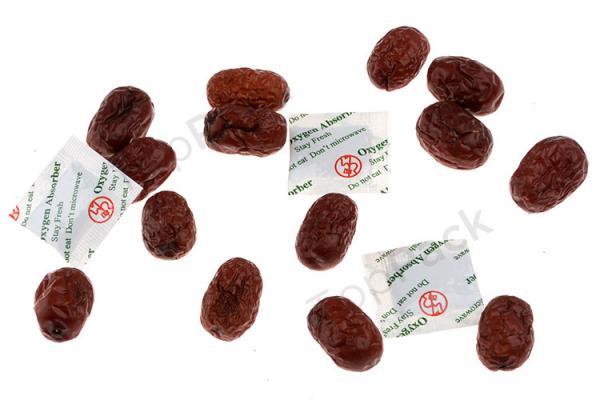| Categories | Food Grade Oxygen Absorbers |
|---|---|
| Brand Name: | TopPack |
| Model Number: | TP-OA09 |
| Certification: | FDA, ROSH, REACH,ISO9001:2008 |
| Place of Origin: | China |
| MOQ: | Depend on whether need to be customized printing |
| Price: | Negotiation |
| Payment Terms: | Western Union, T/T |
| Supply Ability: | 80,000,000PCS per day |
| Delivery Time: | 1. Sample and small order: Within 8working days 2. Bulk order: within 4 weeks |
| Packaging Details: | as100cc-300ml example: 300PCS/Vacuum Bag, 20Bags/Carton or as customer request |
| Package Material: | vacuum by vacuum bag |
| Printing: | could be customized |
| Grease proof or not: | could be customized as customer request |
| Sachet size: | from 10cc to 3000cc |
| Application: | Wheat, rice, grains, seeds |
| Benefit: | Prevents oxidation of vitamins A, C and E |
Oxygen Absorber Packets by TopPack
Food grade Anti oil Deoxidizer which help to keep dessert food products fresh.
Oxy absorbers will remove oxygen from the air in sealed containers. Great for food storage. Vacuum sealed in a thick vacuum bag. Keep sealed until ready for use.
Choose your size:
100 CC Capacity Packets - Package of 500
200 CC Capacity Packets - Package of 400
500 CC Capacity Packets - Package of 250
2000 CC Capacity Packets - Package of 100
What Are Oxygen Absorbers?
Oxygen absorbers are made of a chemical compound, the active ingredient of which is a powdered iron oxide. Our absorbers are completely safe. While they are not edible, they are not toxic. No harmful gases are created and the oxygen does not remove the fresh smell and taste of the product.
What Do Oxygen Absorbers Do?When used with proper packaging and sealing, the oxygen in the packaging is greatly reduced. These oxygen absorbers bring the oxygen level down reliably to .01% or less.
How do I know how many to use in a container?
The calculations for how much CC (cubic centimeters) capacity of oxygen absorbers you need in container and very complex and take into account how much air in the container remains after you fill it with product (seeds, grains, etc...) Assuming you fill the container very nearly full, leaving little or no space at the top, you can use the general rule of thumb below to determine how much CC capacity you need in oxygen absorbers based on the materials you use. The recommended volume should be close to what you need on the low end, and provide a nice buffer on the high end.
#10 Can
Flour, sugar, powdered milk & similar: Use 200 to 300 CC
Wheat, rice, grains, seeds & similar: Use 200 to 300 CC
Beans, large seeds, pasta & similar: Use 300 to 500 CC
5 Gallon Bucket
Flour, sugar, powdered milk & similar: Use 700 to 800 CC
Wheat, rice, grains, seeds & similar: Use 800 to 900 CC
Beans, large seeds, pasta & similar: Use 1000 to 1200 CC
Remember: You don't need to match the CC volume of left over air in a container, just the CC volume of the actual oxygen in the air. Oxygen makes up about 21% of air. So 400 CCs of air has about 84 CCs of oxygen so a 100 CC capacity oxy absorber would do the job. When in doubt, use a little more to be on the safe side.
Typical Applications & Benefits:
Food safe & non-toxic
Commercial grade
Preservation of foods of all types
Preservation of stored seeds & grains
Inhibits growth of mold, spoilage organisms pathogens & insects in stored foods
Preservation of pharmaceuticals and vitamins
Medical diagnostic kits and device perservation
Birdseed and pet food preservation
Artwork preservation
Extends shelf life by removing oxygen
Eliminates the need for additives such as BHA, BHT, sulfur dioxide, sorbates, benzoates, etc
Use with gas flushing / vacuum packaging to absorb virtually all oxygen and absorb any oxygen that may permeate the package.
Significantly improves keeping qualities of polyunsaturated fats and oils
Helps retain fresh-roasted flavor of coffee and nuts
Prevents oxidation of spice oleoresins present in spices themselves and in seasoned foods
Prevents oxidation of vitamins A, C and E
Extends life of pharmaceuticals
Inhibits mold in natural cheeses and other fermented dairy products
Delays non-enzymatic browning of fruits and some vegetables
Inhibits oxidation and condensation of red pigment of most berries
and sauces

|
 Anti oil Deoxidizer Food Grade Oxygen Absorbers keep dessert food products fresh
Anti oil Deoxidizer Food Grade Oxygen Absorbers keep dessert food products fresh
About Us
Customer Services
Sell On Us